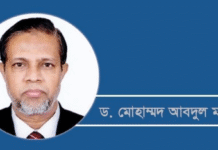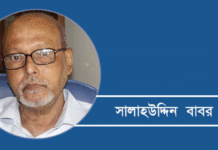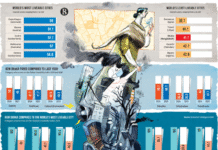
Simplistically put, it is a “procedure vs patient” issue—meaning a “bureaucracy vs ultimate beneficiary” tussle. We, of course, need procedures to work within, otherwise systems would collapse. But of the two, there should not be any doubt as to which should get priority, especially during a pandemic. “Patients” should have been at the centre of the focus but the focus went to “procedure”—meaning bureaucratic control—and that explains why only 24 percent of the development budgetary allocation was spent in the first ten months of the last fiscal year (2020-2021). While most of the block allocation of Tk 10,000 crore for Covid-19 emergencies in the previous fiscal was unspent, patients died due to lack of emergency health services. Tragedy after tragedy occurred when the health ministry was sitting on a Tk 29,247 crore budget allocation. While there were unbelievable sufferings endured by patients all over the country, especially in the big cities including Dhaka, the ministry could not find ways to spend taxpayers’ money to provide emergency services to the sick.
The above was well-reflected in the planning minister Abdul Mannan’s remarks on Sunday, June 6th, at a AmCham webinar that bureaucrats, despite being well-educated, are not smart enough to implement budget in a timely manner, for which this perennial difficulty may persist. “We have to carry out more reforms in the bureaucracy.”
 For all latest news, follow The Daily Star’s Google News channel.
For all latest news, follow The Daily Star’s Google News channel.
We recall how, when the whole country was groping in the dark for ways to fight this unknown virus that crippled the world and us, Tk 100 crore for research lay untouched because bureaucrats could not agree on its methodology—another example of procedure getting the better of the goal.
A public service focused institution like the health ministry cannot be run solely by the same bureaucratic principles and practices as in other ministries that do not deal with human lives. In fact, Covid has revealed, like never before, that a ministry like health must be headed and manned to a significant extent by health professionals who understand the nature of the problems better and have spent their lifetime perfecting ways of serving the people. Of course, there will have to be bureaucratic structures and procedures entwined with this ministry’s work, but these should not have the dominance in decision making as they do now.
At present, the whole system is so structured that professionals are always at the periphery of the decision-making process. A good example of it is the working of the National Technical Advisory Committee on Covid-19, consisting mainly of health experts and professionals. It was set up in April 2020 and, through most of its tenure, its recommendations fell by the wayside. Only recently, some of its suggestions have been reaching the higher levels of the government, proving the failure of the bureaucratic leadership. It is our view that if the health ministry was driven by health professionals instead of bureaucrats, the resultant performance of the ministry would have been dramatically better. There was a time when health professionals used to be appointed in senior positions in the ministry. But those days are long gone. Our suggestion is not a restoration of the old but a complete overhaul and new orientation with the ultimate beneficiaries—the people—at the centre of its thinking.
Ironically, Bangladesh has one of the most elaborate healthcare infrastructures in the developing world. There are about 13,500 Community Clinics (CC) at the union level, followed by 421 Upazila Health Complexes (UHC) along with 1,312 union sub-centres that UHCs also run at the upazila level, followed by 62 district-based hospitals and specialised facilities with the tertiary level at the centre. This four-tier structure—community, primary, secondary and tertiary—gives us a solid public infrastructure to base our health services on. In addition, there are 5,321 public hospitals and clinics and 9,529 registered diagnostic centres.
But as we have reported numerous times in the past, government facilities lack qualified human resources like doctors, nurses and medical technicians as well as proper equipment. For decades, these formidable health facilities have remained heavily underutilised due to lack of proper management and accountability.
Some basic statistics will reveal the challenging situation we are in. According to the official “Health Bulletin”, 2019, there are 6.73 registered physicians per 10,000 people. Directly in the government employ, there are only 1.55 doctors, 0.88 nurses and 0.60 medical technicians per 10,000 individuals. Prof. Nezamuddin Ahmed of BSSMU commented in 2019 that Bangladesh’s health sector is like a “cart before the horse—a huge infrastructure with a huge shortage of human resource.” We can easily imagine the quality and effectiveness of the health services provided with such a population-medical personnel ratio. If we add to this the fact of absenteeism, the picture becomes truly grim.
To bring about a dramatic change in this situation, we need to start at the bottom. If we just take the Community Clinics and transform them into functioning, albeit small, healthcare facilities, then we will have revolutionised our health services. At the moment, the CCs exist more in name rather than in any effective and functional manner. It is run by a Community Healthcare provider whose professional qualifications are better left unsaid. These personnel are of a rudimentary level, their knowledge base is very basic and mostly relates to pregnancy-related issues, and cannot really respond to any other medical need. We can start by investing here first.
The Upazila Health Complex—the next level—which is run by a health and family planning officer, has an annual budget of Tk 1 crore. Ironically, though not surprisingly, they lack the capacity to spend this money. A UHC has digital X-ray machines, ultrasound machines and so on. But due to lack of technical staff and the frequent absence of doctors and nurses, people are deprived of services that they are entitled to from these facilities. Again, the biggest challenge is the absence of qualified medical personnel. Here is another scope to invest.
Considering the above, how can the health ministry justify spending only a small portion of its allocated fund of Tk 29,247 crore? For the coming fiscal year, an allocation of another Tk 32,731 crore has been proposed, with Tk 10,000 crore specifically given for the Covid crisis as before. Are we not looking at a similar performance in the coming year without any reform of any kind in the health sector? In a webinar organised by BIDS on Wednesday, June 9th, Abdur Rouf Talukder, senior secretary of the finance division, expressed his shock saying, “I watched with surprise that the health ministry could not spend a major portion of the funds we gave them amid the pandemic.”
In the new budget proposal, there are no hints of any health-sector reform nor any significant changes at the CC and UHC levels.
Let us not have the illusion that a spending rise will automatically lead to better health services. It may lead to greater corruption, as we have seen in the recent past. Even during the pandemic, irregularities in procurement of lifesaving accessories were frequent. Take, for example, the Tk 350 crore scandal against which doctors protested resulting in the removal of the head of the Central Medical Stores Depot. Interestingly, the disgraced director wrote a letter alleging that a powerful “syndicate” was operating in the health ministry which, he claimed, is mainly responsible for big-time corruption in the ministry. No investigation was done about the allegations he made. There was a time when it was customary for such allegations to be investigated. Not anymore. Because there is no accountability.
We recall the scandal connected with the Regent Hospital and JKG Healthcare company and the high-powered connections that those scandals revealed. We also have not forgotten the case of driver Abdul Malek, who had property worth Tk 100 crore and whose main source of income was influence-peddling as he was the driver of the health secretary. Nothing much came out following his arrest by RAB. We also recall that no action followed a report by the Anti-Corruption Commission (ACC) of January 2019 that identified sources of graft in the health sector, especially related to purchase of machines, surgical equipment, medicine, etc. Later, when instances of corruption surfaced again, the ACC chairman said, “Had the health ministry followed the ACC’s recommendations made last year, unbridled corruption in the health sector could have been reined in.”
Bigger allocation and bigger spending by the health sector must be accompanied by a substantial reform of the health sector, especially of the ministry in which strict methods of transparency and accountability have to be installed, particularly in the areas of purchase where the maximum scope for corruption exists.
We are in the throes of the second wave of coronavirus. We did well in the first, although we are not sure how. We may not be so lucky the second time around. Thus, quick reforms in the health sector are a must. As an immediate task, a greater number of health professionals must be brought into the decision-making structure of the health ministry. The existing Technical Advisory body should be allowed greater involvement and given more power. Immediate steps should be taken to enlarge the services of the Community Clinics and Upazila Health Complexes. The ministry should revisit the recommendations made by the ACC in 2019 and implement the most important ones forthwith. This is important because as the ministry spends more money—and we want them to—the more it will have to check the scope for corruption and waste. As it exists now, the DGHS is too powerful, too big, has too many people, and handles too much money. It should be broken up into more specialised sectors which should be led by health experts and not bureaucrats.
The pandemic is a crisis of a yet-unknown nature. The virus is mutating regularly and posing ever newer threats to the world and to us. We need to be prepared not only for the present but also for what new shape this virus takes, as well as for the newer pandemics that wait in the dark. Global health experts and the WHO are repeatedly warning us about an uncertain future. To tackle the ever-mutating virus and the unknown future health threats, we need to undertake fundamental reforms in our health sector and make it more efficient, science-based, professionally-led and pro-people.
The failure to rise up to the occasion will be a failure whose consequences is totally unknown to us. We have no right to throw our future generation into such uncertainties.
Mahfuz Anam is Editor and Publisher, The Daily Star.










